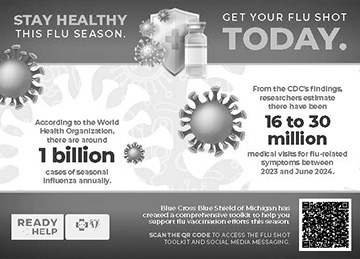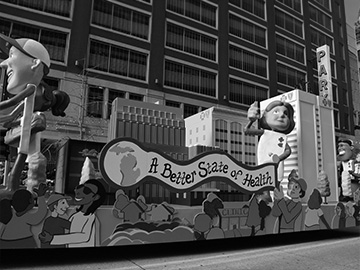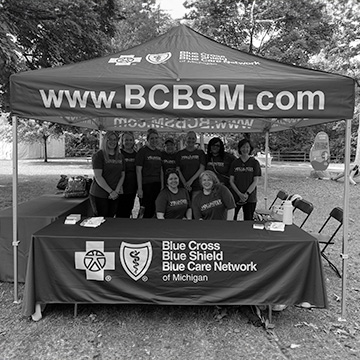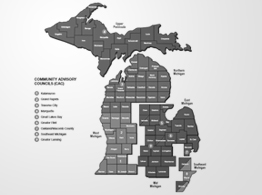Ready to help
Our Community Responsibility team works arm-in-arm with nonprofit organizations which share our goals of improving individual and community well-being, and helping ensure access to quality health care for all Michigan residents. Through these relationships, we proudly demonstrate our commitment to being a trusted community partner, and always ready to help.

Blue Cross releases new Flu Shot Toolkit community resource
Blue Cross Blue Shield of Michigan continues our commitment to improving the health and wellness of Michigan residents this fall through focusing on raising awareness around the influenza virus and its vaccination process. In September, we released a brand-new flu shot toolkit with five, complete messages and downloadable images, to serve as a resource to help Michigan citizens and our community partners prepare for the upcoming flu season.
We also distributed flu shot information postcards and table tents for our partner organizations to use to promote their own flu shot clinics, or to help increase awareness with those they serve. Here are some ways you can check the flu shot off your own to-do list:
- Visit a participating pharmacy.
- Schedule an appointment with your primary care provider.
- Visit one of the many clinics offering free flu shots.
The peak influenza season is between October and May, and the most effective way to protect yourself and others is by getting your annual flu vaccine. Taking this preventative measure not only reduces the chances of the virus spreading, but also decreases the chances of hospitalization. Blue Cross encourages everyone to get their flu vaccines this year as a measure to safeguard themselves and their community.
Blue Cross unveils new America’s Thanksgiving Parade Float – "A Better State of Health"
Blue Cross Blue Shield of Michigan is proud of our long history supporting America’s Thanksgiving Parade both as a Parade Company partner and in having an annual float in the parade itself. The 2024 parade was extra special for us as Daniel J. Loepp served as a grand marshal of the parade. Loepp led BCBSM as president and CEO for 19 years and retired at the end of 2024. Throughout his tenure he has been an avid supporter of the parade and participates on The Parade Company’s Board of Directors, including his roles as immediate past chair and member of the Executive Committee. A born-and-raised Detroiter with a heart for improving the city, the parade is one of Loepp’s favorite traditions.
BCBSM was additionally excited this year to unveil our new float, "A Better State of Health," which tells the story of our ongoing commitment to improving the health of our 5.2 million members, as well as kids, seniors and communities throughout Michigan. Characters at the front of the float are shaped like BCBSM cards – exercising and eating healthy at every phase of life, with support from Blue Cross Blue Shield of Michigan. The middle of the float features the company's Detroit, Grand Rapids, and Lansing office buildings and the statewide employees who provide our members with access to "around-the-clock health care" at any time.

A statewide presence

Corporate volunteer program
Blue Cross employees have a long history of volunteering in communities across Michigan. Each year, thousands of employees donate their time to support events and projects that contribute to the health and vitality of Michigan. Our executives are also involved throughout Michigan, with many taking part in an Executive Volunteer Program that matches Blue Cross leaders to the boards of several statewide nonprofit organizations. If you're interested in recruiting a team of Blue Cross volunteers for your event, please contact us.

Contact your regional oversight team member
Blue Cross Blue Shield of Michigan has dedicated Community Responsibility team members in all parts of the state. Please check our Regional Oversight Map (PDF) to connect with the representative in your area.
Interested in learning more?
Our Community Outreach and Community Responsibility Reports provide detailed information on Blue Cross’ community commitments throughout Michigan.
Request a contribution
All requests must be from Michigan-based 501(c)(3) organizations working to improve health and health care in Michigan. We accept applications for corporate contributions throughout the year. Please review our contribution guidelines before applying.
Blue Cross Blue Shield of Michigan welcomes contribution requests throughout the year from Michigan-based and focused 501(c)(3) organizations seeking funding for programs and activities that:
- Enhance the quality of life for Michigan residents in Michigan communities
- Promote good health in diverse populations, and among youth and seniors
- Improve community health by removing barriers to access of care and quality of care
- Address specific health needs through encouraging healthy lifestyles and behaviors
Corporate contributions will not be normally made for the following:
- In the name of any past or current employee to nonprofit organizations
- Alumni associations
- Individual scholarships
- University or college chairs
- Endowments of any kind
- Any programs outside of Michigan
- Organizations devoted exclusively to research projects
- Political organizations or sectarian programs for religious purposes
- Group travel expenses
- Extracurricular school activities such as sports, band, etc.
- Community sports leagues
- Fund-raising activities related to individual sponsorships such as walk-a-thons, etc.
- Capital campaigns
Don't meet the contribution guidelines? Here are some options.

Social Mission health grants
With grants like Strengthening the Safety Net and Building Healthy Communities, we work with schools and clinics to make the future healthier.

The BCBSM Foundation
Our grants support researchers, students and organizations searching for health care solutions in Michigan.

